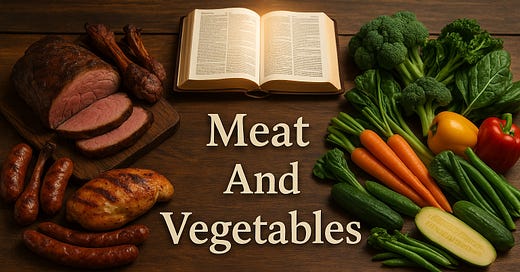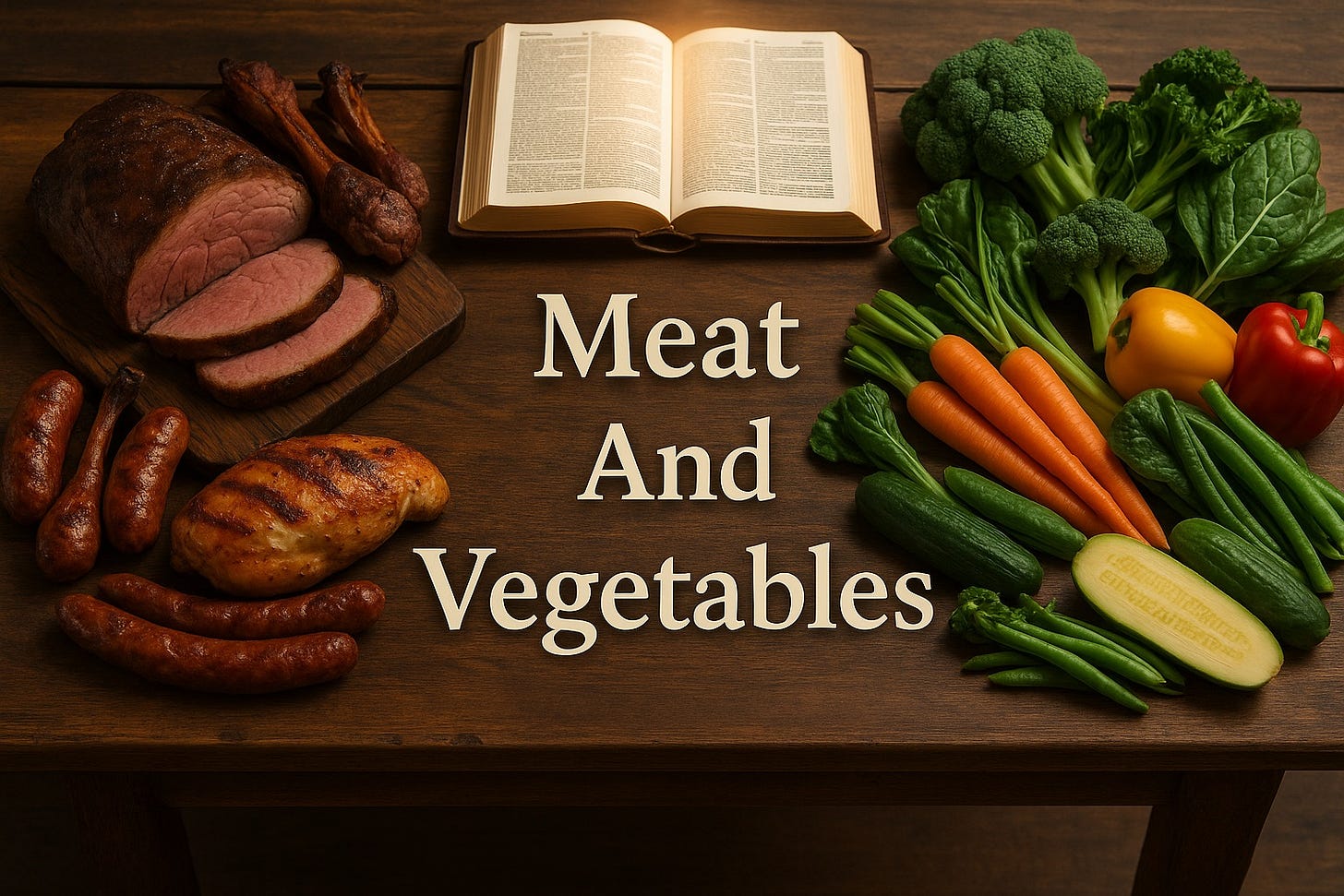Romans 5:12
Therefore, just as through one man sin entered the world, and death through sin, and thus death spread to all men, because all sinned
This verse may seem an unusual choice, given that this post will discuss whether we should eat meat, but there is a reason for it.
IN THE BEGINNING
Romans 5:12 sets the tone for the history of mankind: death entered the world through sin.
Before the Fall of man, there was no death. No living being ever died; no living being ever decayed. Everything was perfect.
I know there will be someone, somewhere, who will say, “Animals and man ate plants and fruits, so there was death before the Fall.” Stop making a fool of yourself. Mankind is made in the image of God (Genesis 1:27), while animals have the breath of life (Genesis 1:30), and God gave them “every green plant for food.” Plants do not possess “lifeblood” (Genesis 9:4).
For a while after the Fall, mankind continued to follow the pattern set in the Garden: we did not eat meat. Even though sin and death were present in the world, mankind did not kill animals to eat. Even the offerings to God were only fruits (Genesis 4:3).
LIFE AFTER THE GREAT FLOOD
After the Great Flood, God allowed mankind to eat animals (Genesis 9:3)—with the condition that the meat must not contain blood (Genesis 9:4).
Later, the restrictions on what could or could not be eaten became more specific (Leviticus 11:1-47). The nation of Israel was to be set apart from all other nations in the world by the way they ate and drank. Many Jewish people follow this “kosher” diet to this day.
The allowance for eating meat came into focus again in the time of Christ. In the New Testament, we see the removal of the old restrictions on “unclean” meats. Jesus told us in Mark 7:19: “And He said to them, ‘Are you so lacking in understanding also? Do you not understand that whatever goes into a man from outside cannot defile him, because it does not go into his heart, but into his stomach, and is eliminated?’ (Thus He declared all foods clean.)”
If the point wasn’t clear enough, a vision was given to the apostle Peter:
Acts 10:10-15
But he became hungry and was desiring to eat; but while they were making preparations, he fell into a trance; and he saw the sky opened up, and an object like a great sheet coming down, lowered by four corners to the ground, and there were in it all kinds of four-footed animals and crawling creatures of the earth and birds of the air. A voice came to him, “Get up, Peter, kill and eat!” But Peter said, “By no means, Lord, for I have never eaten anything unholy and unclean.” Again a voice came to him a second time, “What God has cleansed, no longer consider unholy.”
After the Lord declared all foods clean, including the previously “unclean” foods, arguments persisted. The Jewish believers attempted to adhere to the Mosaic Law regarding food, prompting the Jerusalem Council to clarify the matter.
Acts 15:19-20 tells us: “Therefore it is my judgment that we do not trouble those who are turning to God from among the Gentiles, but that we write to them that they abstain from things contaminated by idols and from fornication and from what is strangled and from blood.”
Interestingly, they say you can’t eat food dedicated to idols, but you can still eat it as long as you don’t ask if it’s idol food (1 Corinthians 10:27-28). Basically, as long as you don’t go to butcher shops asking to buy blood to drink, or chase chickens trying to strangle them to death before eating them, you’ll be fine. Those are the only remaining restrictions regarding food in today’s world, which, realistically, are no restrictions at all.
I know people who nitpick about the “blood” in a rare steak. Can you not eat a rare steak? Fun fact: the red dripping from your steaks isn’t blood at all. Blood is drained from animals before they are butchered and sliced up. The red liquid you see in rare steak is a muscle protein called myoglobin.
Sadly, some people think their faith is stronger if they refuse to eat meat. To such people, the apostle Paul says: “One person has faith that he may eat all things, but he who is weak eats vegetables only” (Romans 14:2). Their faith is only “weak” because of their self-righteous attitude, thinking themselves better than their brethren. Sometimes we must stand up for the truth (Galatians 5:11-12), even if it upsets the “weaker brother.”
Paul tells us in 1 Corinthians 8:13 that “if food makes my brother stumble, I will never again eat meat.” However, in context, he is saying he’d rather avoid eating meat sacrificed to idols if there are brethren who think we ought to avoid it (remember: you can eat idol food if unquestioned, but someone here objected to it).
It’s worth noting Jesus’ own behavior toward meat. Scripture tells us He ate fish (Luke 24:42-43) and lamb (Luke 22:8-15). He also miraculously fed the crowds fish and bread (Matthew 14:17-21)—and why would a vegan do such a thing? The Lord was not a vegan while He walked the earth.
HEAVEN AND THE NEW EARTH
On this earth, eating meat is perfectly acceptable due to the nature of sin (bringing about death); however, in heaven, there will be no more eating of meat. Remember, death is the consequence of sin, and there will be no sin in heaven; thus, there is no death in heaven. Whatever we may eat in the next life, it won’t be meat. Whatever awaits us in the life to come—not just in heaven but also on the new Earth—we can know there will be a peaceful coexistence among all living beings (Isaiah 11:6-8).
Should we feel ashamed of eating meat here if there won’t be meat-eating once we leave sin behind? Of course not! God Himself allowed us to eat meat, and to cast shame on God’s allowance is to cast shame on God Himself.
CONCLUSION
God has allowed us to kill animals so that we may eat their meat. If that does not appeal to you, that’s fine; there is nothing wrong with eating only fruits and vegetables if you prefer. What’s important is that whatever you do, you do it for His glory:
1 Corinthians 10:31
Whether, then, you eat or drink or whatever you do, do all to the glory of God.
Whatever you decide to eat, give thanks to God (1 Thessalonians 5:18), and rejoice and be at peace (Romans 14:17).




